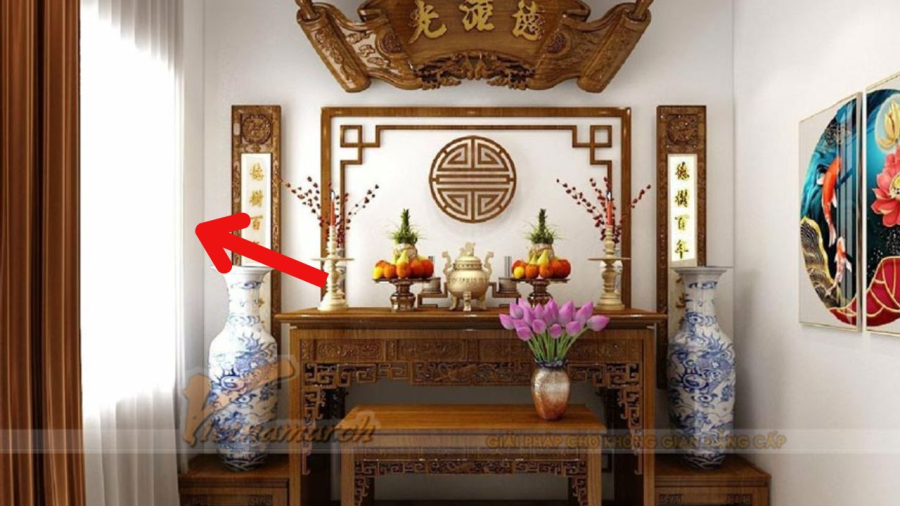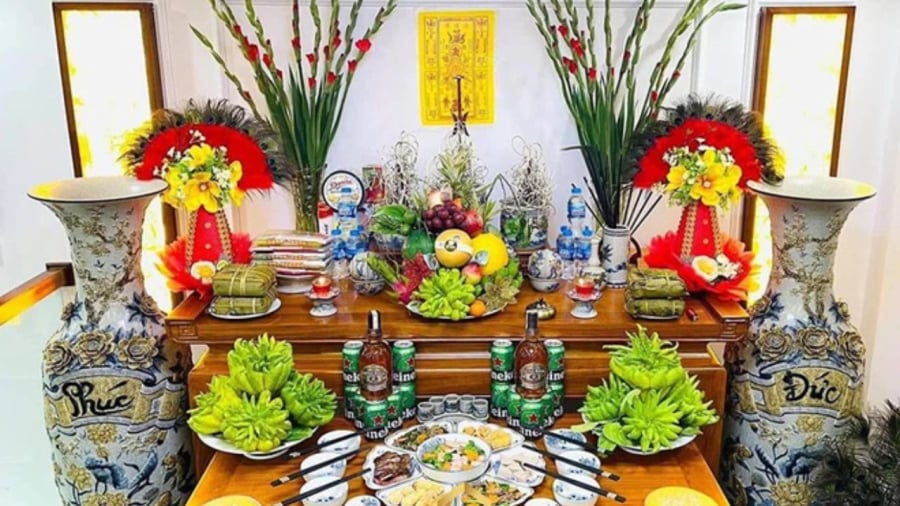The ancestral altar is a sacred space within a family home. The altar is not only a place for spiritual worship but also a reflection of the family’s traditions and values. As such, it deserves careful attention. If you notice any of the following signs, it’s important to make adjustments to avoid offending religious customs and beliefs:
Strong sunlight or bright light shines on the family altar
The family altar is a place of rest for the spirits of ancestors. Altars are considered yin spaces within the home and should be protected from sharp objects and excessive yang energy. While a bright and airy living room creates positive yang energy for the living, altars require softer lighting to create a peaceful resting place for the deceased.
Therefore, it is considered inappropriate in religious customs and beliefs for strong light to shine on the altar, such as sunlight streaming through a nearby window, excessive light from multiple doors, or a chandelier hanging above. These strong light sources can disrupt the energy balance in the worship area, making it difficult for the spirits of ancestors to rest peacefully.

Altar exposed to outdoor lighting
Intense lighting can disrupt the energy balance at the altar, making it difficult for the spirits to remain in the home. This can lead to disharmony within the family and even harm the spirits of the deceased. Additionally, strong winds blowing into the altar area can disrupt the energy of the incense burner, preventing the spirits of ancestors from resting peacefully. Leaving the door wide open can also invite unwanted spirits into the home, causing trouble for the ancestors.
If your altar is currently affected by any of these issues, make the necessary adjustments. Relocate chandeliers or other bright light sources away from the altar. If sunlight or strong winds are an issue, consider closing the doors and placing a bamboo curtain next to the altar. If the altar room has multiple doors, install curtains to control the amount of light entering the space. Red lighting is preferable to harsh white light, but avoid making the room too dark.
Cold and dusty altar, lacking fragrance
A neglected altar can become cold and dusty, especially if it is rarely cleaned or visited. Infrequent incense burning can also contribute to this issue. A cold and dusty altar indicates a lack of care and respect for the ancestors. While elaborate offerings are not necessary, the altar should be well-maintained and regularly visited as a sign of remembrance and gratitude.
Failing to maintain the altar, such as leaving it empty, not burning incense regularly, or allowing it to become dirty and dusty, is considered disrespectful to the ancestors. This can lead to negative consequences, including a loss of family fortune, a lack of protection from the ancestors, and disharmony among family members. In reality, a dirty or neglected space within the home can impact the overall atmosphere and well-being of the family.

Wilted flowers on the altar can affect religious customs and beliefs
Wilted flowers and dead plants on the altar
It is common for people to forget to change the flowers on the altar after burning incense, only replacing them during the next ceremony. This practice should be avoided as wilted flowers emit negative energy. Additionally, the water in the vase may become foul-smelling and stagnant. If plants on the altar are dying or turning yellow, it indicates a lack of energy or excessive heat in that area, suggesting that the altar’s location may need to be adjusted.
Seeing wilted flowers and dead plants on the altar indicates a lack of attention and declining energy in the family. Therefore, it is essential to change this habit when it comes to worship practices.
Reference: Spiritual contemplation





































